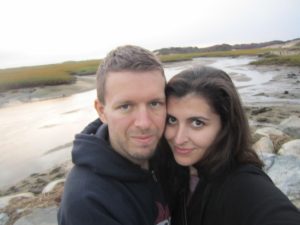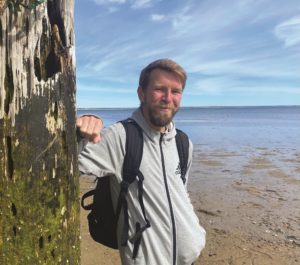“This place will always be a part of my life, more so than I ever imagined,” says the writer Vedran Husić. “The work that I’m doing here is so meaningful to me. I don’t ever want this to become a distant memory.”
Husić is a returning fellow at the Fine Arts Work Center in Provincetown. He came here in 2013-2014 with his fiancée, the Armenian-American writer Naira Kuzmich, who was also a fellow over that winter and spring. “Working together here was wonderful,” Husić says. “We wrote in the mornings and took walks together afterward to Herring Cove or Race Point.”

This time, Husić has come back, alone, to write about losing Kuzmich to lung cancer in 2017, when she was only 29. “The nearly seven years of my life I shared with Naira,” he says, “were the most beautiful thing that has ever happened to me.”
It makes sense to Husić to write about Kuzmich in Provincetown. Surrounded by nature, he senses her presence everywhere. “I’m always just one turn away from a breakdown, and when it becomes too much, I go out and walk in nature,” he says. “I talk to Naira, tell her what I’m seeing, and it helps calm the grief.”
After Kuzmich died, Husić couldn’t write for two years — he could only take notes for a book he wanted to write about her. “I always wanted to come back here to Provincetown with Naira when she was alive,” he says. “When I had the opportunity to return as a FAWC fellow, I thought, what if I start to write the book here, all the beautiful memories and the awful ones — just get it all down. I knew it was going to be painful but also that the intensity would be helpful.”
Husić is no stranger to intensity, pain, and loss. Born in the city of Mostar in Bosnia and Herzegovina in 1986, he was a young child during the Serbian siege of his home city and the subsequent war between Bosnian Catholics and Bosnian Muslims. “To a child, the war came suddenly, in one night,” he says. “I went to bed when it was peace. Then I woke up, and we had to run to the basement.”
Husić’s father was sent to a concentration camp for a year. When he was released, the family moved to Bad Wimpfen, Germany as refugees. Husić’s collection of stories about these experiences, titled Basements and Other Museums, won the St. Lawrence Book Award and was published by Black Lawrence Press in 2018.
After living in Germany for five years, Husić and his parents moved to St. Louis, Mo., where he attended high school. Husić didn’t start writing until his early 20s. Soon afterwards, he met Kuzmich when they were both studying for M.F.A.s at Arizona State University.
“I was a pretty angry person back then,” Husić says, but Kuzmich “felt everything very fiercely, beyond limits, whereas I was holding back. I’m trying to capture that in my writing, how love burst forth through her.”
Husić is currently working on getting Kuzmich’s writing published posthumously. A collection of her stories titled In Everything I See Your Hand will be published by the University of New Orleans Press this June. In his own book-in-progress, Husić writes, “There’s power in writing a word into existence, Naira believed, magic in making an exact sound. Power, she said, magic, she said, a magic beyond just breathing. The magic of intuition, of intelligent appetite, of creation, of imbuing with breath. The power of living and of giving life.”

Kuzmich’s final work was a series of lyrical essays, called The Cancer Cycle, which she wrote in the last months of her life. In his book about her, Husić writes: “What stamina was needed to empty herself like that, of this. And what a painful triumph, her last writings, the translation into words of what was written on her body, the fate oppressing her mind. (Destiny is written on the forehead, Armenians believe, and you had such a small one.)”
Husić describes his helplessness in wanting to alleviate Kuzmich’s pain: “No one says, ‘I love you’ in Armenia. This is what we say, instead: Tsaved thanem. Let me please bear your pain.”
While Husić writes about cancer in his book — “You can’t avoid it,” he says — what he is most interested in is “this idea of destiny, of circumstance. Cancer, war, a freak car accident — random things happening that take a person’s life suddenly, even a very young life. What is the meaning of all this?” he asks.
Husić is weaving a second thread into his book about a character, Viktor, who has gone through the war he experienced as a child. “The Viktor section provides a counterweight to the autobiographical Vedran section,” he says. War, though, is different from cancer in that it is avoidable. “A person can stop shooting at another person,” he says. “That is simplistic, but I don’t need anybody’s complex explanation for why they’re fighting. I had the simplicity of growing up under bombs going off and my mother throwing her body on top of mine to protect me. And I don’t want that ever again, for anybody.”
But Husić does want a different kind of simplicity. “I just want to have a normal, quiet life,” he says. “To write and enjoy the little moments that are joyful. And do right by the people that I love.”
It is also simplicity that Husić is striving for in his book. “If I could just capture the way she rose from the couch,” he says, “the movement of her uncoiling, so that the reader will see her in front of their eyes and will feel her enormous presence. That would be enough for me.”
Loss for Words
The event: A reading by Fine Arts Work Center writing fellows Vedran Husić and H.R. Webster
The time: Saturday, April 16 at 7 p.m.
The place: Stanley Kunitz Room, Fine Arts Work Center, 24 Pearl St., Provincetown; or online at fawc.org
The cost: Free
